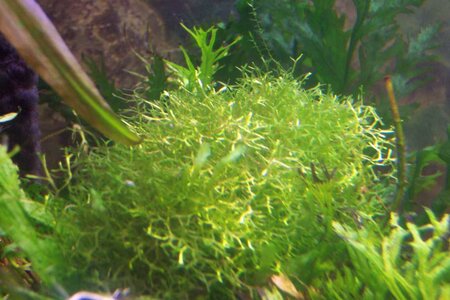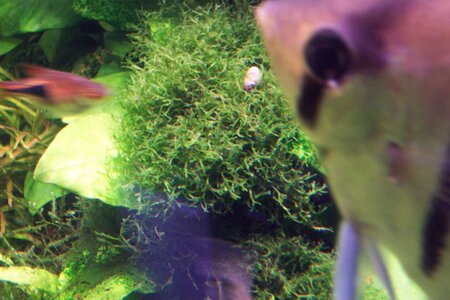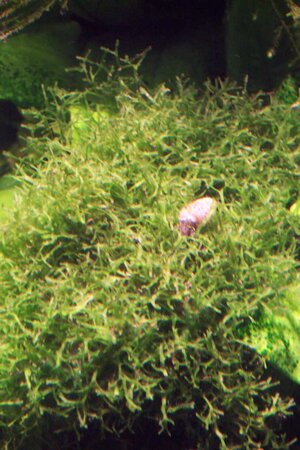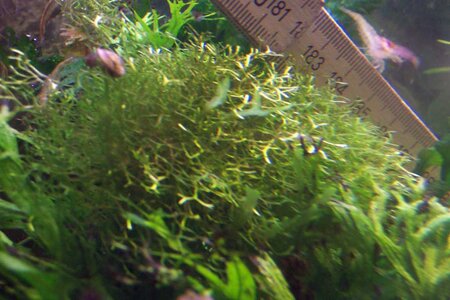Du verwendest einen veralteten Browser. Es ist möglich, dass diese oder andere Websites nicht korrekt angezeigt werden.
Du solltest ein Upgrade durchführen oder einen alternativen Browser verwenden.
Du solltest ein Upgrade durchführen oder einen alternativen Browser verwenden.
Riccia - Diskussionsthread
- Ersteller achim-cool
- Erstellt am
johnny.winter
Member
Re: Pflanzenbestimmung Mini-Pelia?
Hallo Achim,
Mini-Pellia sieht bei mir anders aus. Wobei ich nicht 100%ig sicher bin, dass ich überhaupt die korrekte Bezeichnung zu dem Kraut bekommen habe. Ich kann gerade kein vernünftiges Foto machen, weil ich das Zeugs in ein anderes AQ verfrachtet habe - dementsprechend zerfledert sieht es jetzt aus.
Deine Pflanze sieht mir schon sehr stark nach Riccia aus. Mal sehen, was man aus kompetenterer Feder so liest...
Hallo Achim,
Mini-Pellia sieht bei mir anders aus. Wobei ich nicht 100%ig sicher bin, dass ich überhaupt die korrekte Bezeichnung zu dem Kraut bekommen habe. Ich kann gerade kein vernünftiges Foto machen, weil ich das Zeugs in ein anderes AQ verfrachtet habe - dementsprechend zerfledert sieht es jetzt aus.
Deine Pflanze sieht mir schon sehr stark nach Riccia aus. Mal sehen, was man aus kompetenterer Feder so liest...
achim-cool
Member
Re: Pflanzenbestimmung Mini-Pelia?
Danke Jan,
deshalb bin ich mir ja nicht so sicher.
Aber Riccia hat ja einen Starken Auftrieb, dieses Pflänzchen halt nicht!!
Also warten wir auf andere Meinungen!
Werde nochmal im anderen Becken ein Foto machen!
Gruß Achim
Danke Jan,
deshalb bin ich mir ja nicht so sicher.
Aber Riccia hat ja einen Starken Auftrieb, dieses Pflänzchen halt nicht!!
Also warten wir auf andere Meinungen!
Werde nochmal im anderen Becken ein Foto machen!
Gruß Achim
Re: Pflanzenbestimmung Mini-Pelia?
Hi Achim,
zu 100% Riccia.
Hi Achim,
zu 100% Riccia.
achim-cool
Member
Re: Pflanzenbestimmung Mini-Pelia?
Hi,
das ist ganz einfach Riccia fluitans. Diese Sache mit "rhenana" kann ich nicht so ganz nachvollziehen, da normales Riccia sowohl die eine wie auch die andere Form ausbilden kann. Umgebungsbedingungen sind hierfür maßgeblich entscheidend.
Du wirst so gesehen leider auch nur die "Plage" Riccia in deinem Becken haben... auch wenn sie momentan nicht aufschwimmt.
Hi,
das ist ganz einfach Riccia fluitans. Diese Sache mit "rhenana" kann ich nicht so ganz nachvollziehen, da normales Riccia sowohl die eine wie auch die andere Form ausbilden kann. Umgebungsbedingungen sind hierfür maßgeblich entscheidend.
Du wirst so gesehen leider auch nur die "Plage" Riccia in deinem Becken haben... auch wenn sie momentan nicht aufschwimmt.
Re: Pflanzenbestimmung Mini-Pelia?
Hi Achim,
wenn ich die Anubias-Blätter daneben sehe, habe ich noch eine Vermutung: Riccia sp. 'Dwarf'. Könntest du noch ein Foto von der Riccia machen, zusammen mit einer Millimeterskala (Lineal o.ä.)?
Gruß
Heiko
Hi Achim,
wenn ich die Anubias-Blätter daneben sehe, habe ich noch eine Vermutung: Riccia sp. 'Dwarf'. Könntest du noch ein Foto von der Riccia machen, zusammen mit einer Millimeterskala (Lineal o.ä.)?
Gruß
Heiko
Re: Pflanzenbestimmung Mini-Pelia?
Hi noch mal,
zum Riccia fluitans/rhenana-Problem zitiere ich hier mal aus thekrib.com, http://www.thekrib.com/Plants/Plants/Riccia.html#7
Brant Bassam ("bassambj"), 28.04.1999:
Zu Riccia rhenana hatte ich schon woanders öfter was vom Stapel gelassen. Die Botaniker kennen tatsächlich eine Riccia rhenana, unterscheiden die aber von R. fluitans nicht danach, ob sie sinkt oder nicht, sondern unter anderem nach der Breite der emersen Thalli, bei R. fluitans bis 1,5 (1,8) mm, bei R. rhenana bis 2,8 mm breit: http://de.wikipedia.org/wiki/Riccia_fluitans
Es kann sein, dass sich Riccia rhenana unter den Aquarien-Riccias rumtreibt, das muss aber nicht unbedingt die sinkende Form sein.
Gruß
Heiko
Hi noch mal,
zum Riccia fluitans/rhenana-Problem zitiere ich hier mal aus thekrib.com, http://www.thekrib.com/Plants/Plants/Riccia.html#7
Brant Bassam ("bassambj"), 28.04.1999:
... About a year ago I noticed that a sport had developed on a piece of my Riccia.
It derives from the normal form but it has lost its buoancy chambers and looks a
pure, somewhat darker, green. It also has a neutral to negative buoancy-- it
sinks!
I have since grown this up into a lovely field of green. It grows fast and is a
dream to work with. It's almost too good, as the bits you break or trim off
gather in amoungst the other plants and grow into dense mats of their own. I
have passed this form to friends here as cultivar "Brant". Very interesting to
read that Neil Frank obtained a similar cultivar directly from Amano himself.
Contrary to popular opinion, this is not Riccia rhenana, but a natural sport of
Riccia fluitans. There are also occasional sports you will find with slightly
different growth habits. Mine grows down and spreads laterally but I have
another sport that forks finely and points straight up (also the dark green
sinking type). The sinking form will occasionally revert to wild-type and go
light green and want to float again. Keeping a little of this mixed in with the
dark stuff adds a nice contrast--reminds me of a coral reef.
The good news is, most gardeners can get the sinking type with perseverence.
Just keep a close eye on your material. Keep some growing till you see what you
want and nurture the small dark form when it appears. It is a magic plant. I
think the best I have ever grown for a Nature Aquarium. ...
Zu Riccia rhenana hatte ich schon woanders öfter was vom Stapel gelassen. Die Botaniker kennen tatsächlich eine Riccia rhenana, unterscheiden die aber von R. fluitans nicht danach, ob sie sinkt oder nicht, sondern unter anderem nach der Breite der emersen Thalli, bei R. fluitans bis 1,5 (1,8) mm, bei R. rhenana bis 2,8 mm breit: http://de.wikipedia.org/wiki/Riccia_fluitans
Es kann sein, dass sich Riccia rhenana unter den Aquarien-Riccias rumtreibt, das muss aber nicht unbedingt die sinkende Form sein.
Gruß
Heiko
Erwin
Well-Known Member
Re: Pflanzenbestimmung Mini-Pelia?
Hallo,
Brünner schreibt 1984 im Handbuch AQ-Pflanzen bei Riccia fluitans:
Auch hatte ich schon beide Wuchsformen gemeinsam im AQ. Also gleichzeitig eine aufschwimmende und eine absinkende Wuchsform.
Weitere Unterschiede sah ich in Wachstumsgeschwindigkeit, Größe, Form und Farbe.
MfG
Erwin
Hallo,
Quelle: Aquarienatlas Band 3 - 1. Auflage 1990Riccia rhenana LORBEER ex. K. MÜLLER, 1941 Absinkendes Teichlebermoos
Brünner schreibt 1984 im Handbuch AQ-Pflanzen bei Riccia fluitans:
Sehr ähnlich ist Riccia rhenana (nur durch eine Chromosomenuntersuchung sicher von Riccia fluitans zu unterscheiden).
Auch hatte ich schon beide Wuchsformen gemeinsam im AQ. Also gleichzeitig eine aufschwimmende und eine absinkende Wuchsform.
Weitere Unterschiede sah ich in Wachstumsgeschwindigkeit, Größe, Form und Farbe.
MfG
Erwin
Re: Pflanzenbestimmung Mini-Pelia?
Danke, Erwin!
Dann geht die Aquariengeschichte des Namens "Riccia rhenana" also schon ziemlich früh los. Wer weiß, vielleicht wurde er das erste Mal von den Aquarienatlas-Autoren mit der "Sinkform" verbunden, etwa nach dem Schema: "es gibt neben der normalen Riccia die absinkende Riccia, in Aquarienliteratur (z.B. Brünner) wird außer R. fluitans eine R. rhenana erwähnt, also muss es die sein"?
Also kann man festhalten, gleichzeitig und unter gleichen Bedingungen kann es in Aquarien verschiedene Riccias geben. Riccia sp. 'Dwarf' lasse ich hier mal außen vor, ich meine hier das größere Zeug, was als "normale Riccia fluitans" und "Riccia rhenana" angesehen wird. Meinungen:
1 - Alles das gleiche, eine Form kann sich in die andere reversibel umwandeln. (Brant Bassam, Tobi)
2 - Stabil unterschiedliche Riccias. Eine schwimmende und eine sinkende. (u.a. Aquarienatlas Bd. 3)
3 - meine Vermutung: es gibt abgesehen von der 'Dwarf' noch mindestens 3 verschiedene Aquarien-Riccias. Alle können sowohl hellgrüne Schwimm- als auch dunkelgrüne Sinkformen bilden. Vielleicht neigen aber die einen stärker zur Bildung der Sinkform als die anderen.
Ich hatte mal gleichzeitig "normale Aquarien-R. fluitans" und einheimische R. fluitans aus einem Tümpel bei Göttingen im Aquarium, beide in der Schwimmform. "Die einheimische" blieb kleiner, graziler und brüchiger, die "Aquarien-Riccia" größer und stabiler, emers bildete diese auffällig breite Thalli, passend zur Beschreibung von R. rhenana in Moosbestimmungs- (nicht Aquarien-)Literatur. "Die einheimische" war wahrscheinlich R. fluitans im engeren Sinne.
Ich meine, es gibt noch eine dritte Aquarien-Riccia, unterschiedlich von der "normalen Aquarien-Riccia". Arbeitsname: "die Seuche" . Stärker zur Sinkform neigend, wuchernd, lange, aufrechte, auch submers bis ca. 2 mm breite Äste bildend.
. Stärker zur Sinkform neigend, wuchernd, lange, aufrechte, auch submers bis ca. 2 mm breite Äste bildend.
Die Botaniker unterscheiden die Riccias aus der fluitans-Gruppe (R. fluitans, rhenana, canaliculata, duplex) nach Merkmalen des emersen Thallus und nach der Chromosomenzahl. Man müsste mal die verschiedenen Aquarien-Riccias emers unter gleichen Bedingungen kultivieren.
Gruß
Heiko
Danke, Erwin!
Dann geht die Aquariengeschichte des Namens "Riccia rhenana" also schon ziemlich früh los. Wer weiß, vielleicht wurde er das erste Mal von den Aquarienatlas-Autoren mit der "Sinkform" verbunden, etwa nach dem Schema: "es gibt neben der normalen Riccia die absinkende Riccia, in Aquarienliteratur (z.B. Brünner) wird außer R. fluitans eine R. rhenana erwähnt, also muss es die sein"?
Also kann man festhalten, gleichzeitig und unter gleichen Bedingungen kann es in Aquarien verschiedene Riccias geben. Riccia sp. 'Dwarf' lasse ich hier mal außen vor, ich meine hier das größere Zeug, was als "normale Riccia fluitans" und "Riccia rhenana" angesehen wird. Meinungen:
1 - Alles das gleiche, eine Form kann sich in die andere reversibel umwandeln. (Brant Bassam, Tobi)
2 - Stabil unterschiedliche Riccias. Eine schwimmende und eine sinkende. (u.a. Aquarienatlas Bd. 3)
3 - meine Vermutung: es gibt abgesehen von der 'Dwarf' noch mindestens 3 verschiedene Aquarien-Riccias. Alle können sowohl hellgrüne Schwimm- als auch dunkelgrüne Sinkformen bilden. Vielleicht neigen aber die einen stärker zur Bildung der Sinkform als die anderen.
Ich hatte mal gleichzeitig "normale Aquarien-R. fluitans" und einheimische R. fluitans aus einem Tümpel bei Göttingen im Aquarium, beide in der Schwimmform. "Die einheimische" blieb kleiner, graziler und brüchiger, die "Aquarien-Riccia" größer und stabiler, emers bildete diese auffällig breite Thalli, passend zur Beschreibung von R. rhenana in Moosbestimmungs- (nicht Aquarien-)Literatur. "Die einheimische" war wahrscheinlich R. fluitans im engeren Sinne.
Ich meine, es gibt noch eine dritte Aquarien-Riccia, unterschiedlich von der "normalen Aquarien-Riccia". Arbeitsname: "die Seuche"
Die Botaniker unterscheiden die Riccias aus der fluitans-Gruppe (R. fluitans, rhenana, canaliculata, duplex) nach Merkmalen des emersen Thallus und nach der Chromosomenzahl. Man müsste mal die verschiedenen Aquarien-Riccias emers unter gleichen Bedingungen kultivieren.
Gruß
Heiko
Erwin
Well-Known Member
Re: Pflanzenbestimmung Mini-Pelia?
Hallo Heiko,
demzufolge könnte es ja sogar sein, dass die meisten in ihren Becken keine R. fluitans haben sondern die R. rhenana? :wink:
Denn vom lateinischen Wortstamm her läge es ja nahe, dass alles was aufschwimmt einfach (fälschlich) als fluitans bezeichnet wurde. :wink:
Die absinkende Form habe ich nie als Plage empfunden. Ganz im Gegenteil, sie wuchs bei mir geschätzte 10 mal langsamer als die auftreibende Art, die ich zwangsweise am auftreiben hinderte.
Ich habe kein einziges mal bemerken können, dass sich die sinkende Form in eine schwimmende verwandelt.
Äusserst selten fand ich jedoch im aufschwimmenden Bestand einzelne zierliche absinkende Teile. (Nicht zu verwechseln mit aufschwimmenden Kümmerformen wegen Lichtmangel)
In der o.g. Literatur wird davon auch berichtet, dass beide Arten zusammen vorkommen.
Wegen der Chromosomenuntersuchung hielt ich die absinkende Form bisher für eine Art Mutation, die eben keine auftreibenden Kammern mehr bildet.
MfG
Erwin
Hallo Heiko,
demzufolge könnte es ja sogar sein, dass die meisten in ihren Becken keine R. fluitans haben sondern die R. rhenana? :wink:
Denn vom lateinischen Wortstamm her läge es ja nahe, dass alles was aufschwimmt einfach (fälschlich) als fluitans bezeichnet wurde. :wink:
Die absinkende Form habe ich nie als Plage empfunden. Ganz im Gegenteil, sie wuchs bei mir geschätzte 10 mal langsamer als die auftreibende Art, die ich zwangsweise am auftreiben hinderte.
Ich habe kein einziges mal bemerken können, dass sich die sinkende Form in eine schwimmende verwandelt.
Äusserst selten fand ich jedoch im aufschwimmenden Bestand einzelne zierliche absinkende Teile. (Nicht zu verwechseln mit aufschwimmenden Kümmerformen wegen Lichtmangel)
In der o.g. Literatur wird davon auch berichtet, dass beide Arten zusammen vorkommen.
Wegen der Chromosomenuntersuchung hielt ich die absinkende Form bisher für eine Art Mutation, die eben keine auftreibenden Kammern mehr bildet.
MfG
Erwin
Re: Pflanzenbestimmung Mini-Pelia?
Hallo Erwin,
Ich weiß nicht, ob die dunkelgrünen Sinkformen gar keine Kammern ausbilden, oder doch zwar welche anlegen, aber die sich nicht mit Luft füllen. Könnte man durch Mikroskopieren von Querschnitten rauskriegen.
Gruß
Heiko
Hallo Erwin,
Halte ich für möglich! Wer weiß, vielleicht gehen R. rhenana-Vorkommen in der Natur z.T. auf ausgebüchste Aquarien-Riccia zurück. Auf die müsste man mal die Bryologen ansetzen.demzufolge könnte es ja sogar sein, dass die meisten in ihren Becken keine R. fluitans haben sondern die R. rhenana? :wink:
Ich könnte mir gut vorstellen, dass man sich das so zusammengereimt hat :wink:Denn vom lateinischen Wortstamm her läge es ja nahe, dass alles was aufschwimmt einfach (fälschlich) als fluitans bezeichnet wurde. :wink:
Vielleicht war es eine andere als die *grins* Seuche.Die absinkende Form habe ich nie als Plage empfunden. Ganz im Gegenteil, sie wuchs bei mir geschätzte 10 mal langsamer als die auftreibende Art, die ich zwangsweise am auftreiben hinderte.
Könnte evtl. klappen, wenn sie an der Oberfläche befestigt wird.Ich habe kein einziges mal bemerken können, dass sich die sinkende Form in eine schwimmende verwandelt.
Ich weiß nicht, ob die dunkelgrünen Sinkformen gar keine Kammern ausbilden, oder doch zwar welche anlegen, aber die sich nicht mit Luft füllen. Könnte man durch Mikroskopieren von Querschnitten rauskriegen.
Gruß
Heiko
achim-cool
Member
Re: Pflanzenbestimmung Mini-Pelia?
Hallo,
da hab ich ja eine rege Diskussion vom Stapel getreten!!!
Die Pflanze ist wirklich keine Plage, da sie sehr langsam wächst! Dies auch unter verschiedenen Bedingungen! CO² Zugabe wirkt sich nicht auf das Wachstum aus! mit dem Zollstock mach ich noch mal - Siehe Bilder!!
Gruß Achim
Hallo,
da hab ich ja eine rege Diskussion vom Stapel getreten!!!
Die Pflanze ist wirklich keine Plage, da sie sehr langsam wächst! Dies auch unter verschiedenen Bedingungen! CO² Zugabe wirkt sich nicht auf das Wachstum aus! mit dem Zollstock mach ich noch mal - Siehe Bilder!!
Gruß Achim
Anhänge
Ähnliche Themen
- Antworten
- 7
- Aufrufe
- 1K






